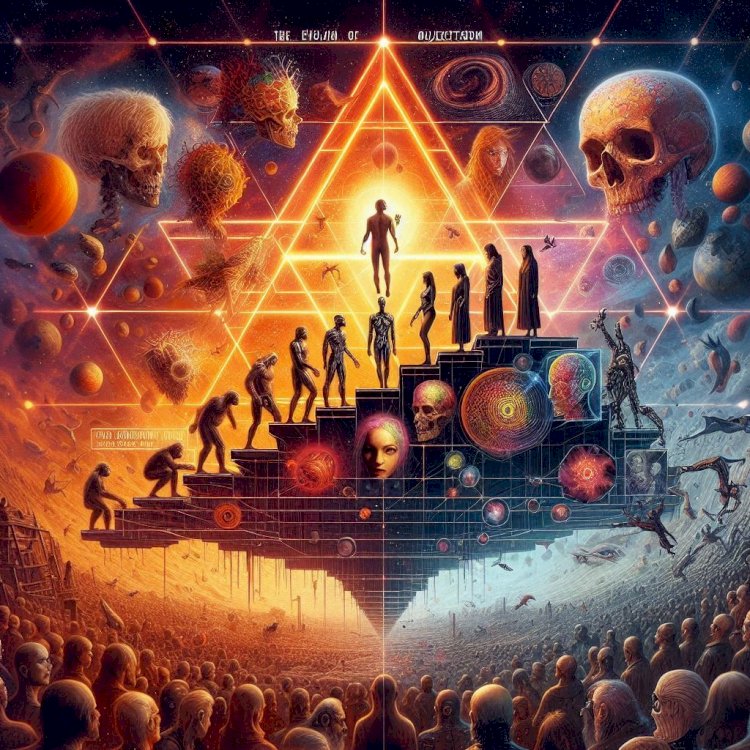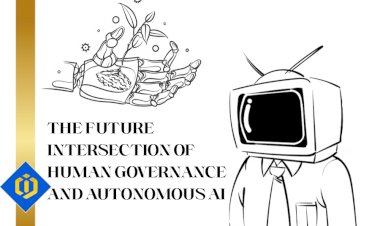The Fusion of Neo-Nihilism and Objectivism in the Age of AI: Charting the Human-Technology Frontier

By Dr. Pooyan Ghamari, Swiss Economist and Visionary
The spark for this exploration came from profound discussions with someone deeply significant in my life. Together, we delved into the philosophies of nihilism and objectivism, debating how these concepts could converge to provide fresh perspectives in a world shaped by rapid technological progress. These exchanges were not just abstract exercises; they served as the intellectual bedrock for many of my thoughts on the intersection of technology, artificial intelligence (AI), and human potential.
As technology continues to redefine the world we live in, the philosophical paradigms of neo-nihilism and objectivism offer essential tools for navigating this evolving landscape. Neo-nihilism frees us from the constraints of old values, empowering us to create new meaning in an era driven by AI, while objectivism gives us the rational framework to pursue individual success. Together, these ideas form a powerful guide for engaging with AI, human genetics, and other systems that are reshaping our future.
Neo-Nihilism: Embracing Freedom from Traditional Constraints
Our discussions frequently returned to the core of nihilism—the rejection of any inherent meaning in life. But rather than seeing this as a negative or bleak outlook, we viewed it as liberating. Neo-nihilism, in our view, was not about succumbing to despair but about the freedom to create our own purpose in a world where none is imposed. This has never been more relevant than it is today, as we navigate a society increasingly influenced by AI and technology, where traditional structures hold less sway.
In the human-AI matrix, neo-nihilism offers a way to see technology for what it truly is: a neutral tool, without inherent meaning, waiting for human input to shape its use. Just as AI systems are shaped by the data they process, humans are shaped by our experiences, environments, and education. But as AI evolves at an extraordinary pace, neo-nihilism reminds us that we—not technology—are responsible for defining meaning in this new landscape.
These conversations reinforced the idea that humans, much like the algorithms we create, are constantly evolving and adapting. In this sense, the lack of inherent meaning in technology becomes a canvas for innovation, enabling us to impose our own values and create new realities. My work in blockchain, particularly through the A.Land project, embodies this approach. Through tokenization, people are empowered to shape their own financial futures, free from the constraints of traditional systems—this is neo-nihilism applied to real-world challenges.
Objectivism: Rational Self-Interest in the Technological Era
While neo-nihilism liberates us from outdated systems, objectivism provides the rational foundation for personal achievement in a world increasingly shaped by AI. My conversations frequently touched on Ayn Rand’s objectivism, especially its emphasis on rational self-interest. Objectivism celebrates the power of the individual to reason and pursue their own goals, while also recognizing the role that innovation and community play in personal success.
In today’s world, rational self-interest takes on new dimensions, as understanding AI, blockchain, and the modern economic systems they drive becomes essential. While AI may process data at speeds far greater than human capability, it lacks the ethical reasoning and creativity that define human uniqueness. Objectivism teaches us to apply rational thought in order to guide these technologies in the service of human progress.
The principles of objectivism are evident in the decentralized financial systems I’ve helped create. Platforms like A.Land allow individuals to bypass traditional financial gatekeepers and take direct control of their economic futures. Here, the rational pursuit of self-interest isn’t simply about personal gain—it’s about leveraging the most advanced tools to achieve freedom, while also ensuring these technologies are used ethically and creatively.
Our discussions consistently returned to the idea that objectivism ensures we use AI and technology as tools to enhance human potential, rather than allowing them to control us. This rational framework enables us to thrive in a technological world by fostering innovation and improving both individual and societal outcomes.
The Human-AI Matrix: Harmonizing Philosophical Perspectives
As my exploration deepened, it became clear that neo-nihilism and objectivism are not opposing philosophies, but rather complementary perspectives that provide a coherent framework for navigating the complex interplay between humans and technology. Together, they shape what I call the "human-AI matrix"—a constantly evolving system where genetics, education, and technological tools interact to expand human potential.
In this matrix, neo-nihilism offers the freedom to innovate and create without being limited by outdated values, while objectivism provides the rational foundation necessary to achieve success within this system. Like AI algorithms that process inputs to generate outputs, humans also operate within a feedback loop where our experiences and knowledge inform our actions and innovations.
We are not passive participants in this matrix. We are both its creators and its products, continuously evolving alongside the technologies we develop. Like AI, our minds can learn from the world around us, adapt to new information, and shape the future through rational thought and creative action.
Education as the Key to Unlocking Human Potential
A recurring theme in our discussions was the idea that education functions much like the code that programs AI. Just as AI evolves through the data it receives, humans evolve through the knowledge and experiences that shape us. In this sense, education is not just the transfer of information—it is the programming of human potential.
Within the context of neo-nihilism and objectivism, education becomes an active process of self-programming. We are not merely passive recipients of knowledge but agents of our own learning, choosing what to absorb and how to apply it. These philosophies converge here: neo-nihilism grants the freedom to define our path, while objectivism ensures we do so rationally to achieve meaningful goals.
Understanding how we learn and how our genetic coding influences us is crucial for navigating the human-AI matrix. By optimizing education and self-learning, we can unlock the full potential of both human intelligence and artificial systems, using these tools to innovate, create, and evolve.
The Matrix as a Tool for Human Freedom
One of the ideas that often surfaced in our conversations was that the AI-driven matrix is not a threat but a tool waiting for human guidance. Neo-nihilism reminds us that the matrix, like life, is inherently neutral—it holds no inherent meaning until we assign it one. Objectivism ensures that we assign this meaning rationally, using technology to advance human interests and unlock potential.
In this emerging world, AI and technology act as extensions of the human mind, amplifying our capacity to learn, create, and innovate. We are free to use these tools to define our future, building a world where technological power and human freedom align.
Building the Future: A Synthesis of Thought and Innovation
Reflecting on these conversations and the philosophical insights they generated, I have come to see neo-nihilism and objectivism as the twin pillars that support our navigation of the future. Within the human-AI matrix, where human intelligence and technology converge, we are both creators and products of this evolving system. The future is not something we enter passively—it is something we actively build through innovation, rational thought, and self-determination.
By embracing the freedom to create our own meaning (neo-nihilism) and pursuing rational self-interest (objectivism), we can chart a path forward in a world increasingly shaped by AI, technology, and human potential.
About the Author: Dr. Pooyan Ghamari is a Swiss economist, visionary, and entrepreneur recognized for his work in blockchain technology, decentralized finance, and the integration of AI into human systems. As the founder of the A.Land project, he explores the intersection of technology and human potential, with a mission to redefine the future of finance and society.

 content-team
content-team 


















